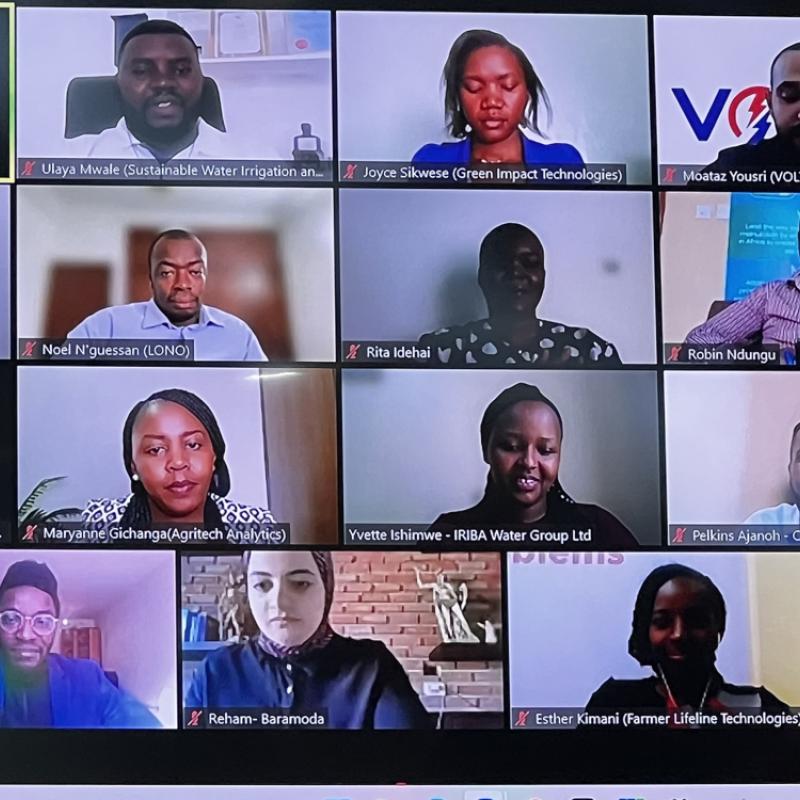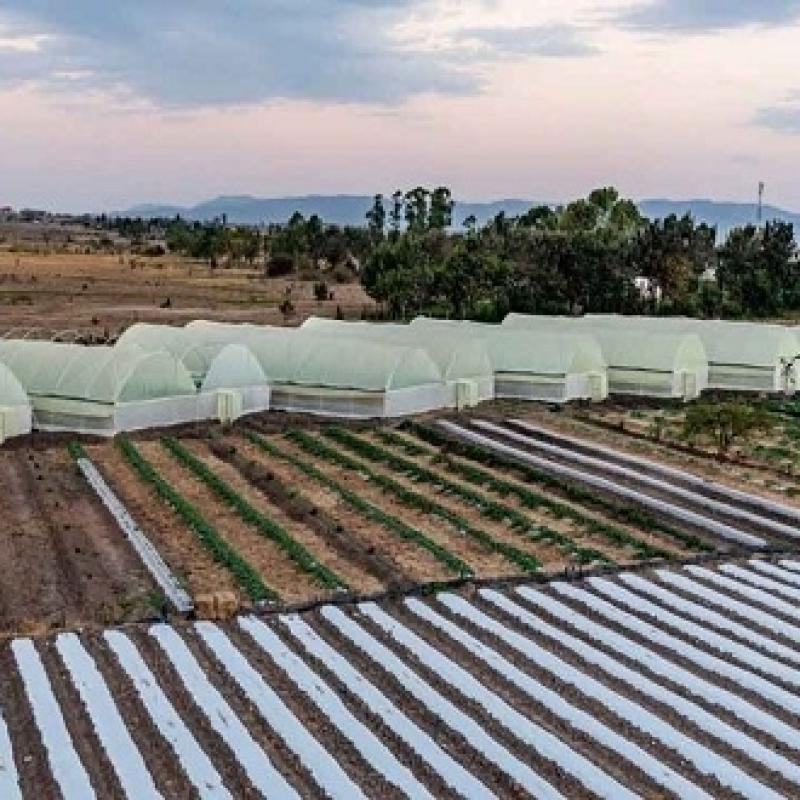
AAAP in the Media
Displaying 1 - 12 of 12
Experts share lessons learned on gender-responsive climate action during Commonwealth NDC webinar
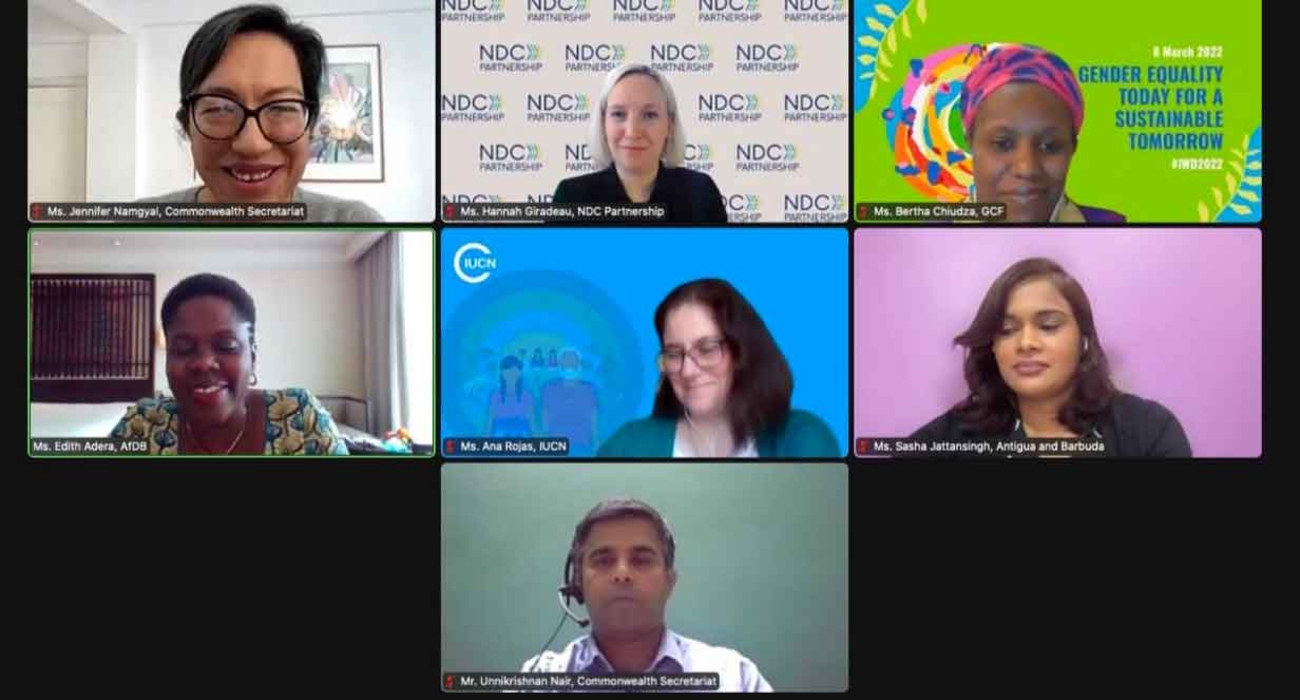
This year, Edith Ofwona Adera, Coordinator of the Africa Adaptation Acceleration Program (AAAP) and the African Development Bank’s Regional Principal Officer for Climate Change and Green Growth, marked International Women’s Day in a special way.
Adera took part in a panel discussion organised by the Commonwealth Secretariat, reflecting this year’s theme: Gender equality today for a sustainable tomorrow.
The panel, hosted by Jennifer Namgyal of the Commonwealth Secretariat, brought together experts who shared their experiences and lessons learned on integrating gender equality in Nationally Determined Contributions, or NDCs, across their respective regions and institutions. NDCs are national plans highlighting climate actions, including targets, policies and measures that governments aim to implement.
Hannah Girardeau, of the NDC Partnership Support Unit, kicked off the session with a presentation on the findings of an analysis of gender considerations in revised NDCs of the partnership’s member countries. The assessment revealed that more countries had now included the fundamental building blocks of gender-responsive climate action in their policies and plans. Girardeau noted that there is a need to invest in other critical elements such as conducting gender analyses, developing indicators, and establishing gender-responsive budgets to complement progress achieved.
Adera agreed with her. “As climate change impacts affect people differently, the responses need to be differentiated, based on identified unique needs, informed by disaggregated data,” Adera added.
To address this challenge, the African Development Bank is supporting national statistical systems in five countries through a Capacity Building for Gender Statistics and Monitoring Systems project. The project aims to produce quality, comparable and regular gender statistics to address national data gaps, strengthen monitoring systems, and integrate gender indicators across sectors.
Bertha Chiudza of the Green Climate Fund said a key requirement for all its financed activities is to ensure gender considerations are included in the development of action plans and assessments. “For its support on Nationally Determined Contributions, the Green Climate Fund ensures that gender considerations are brought in from planning and design, implementation and reporting across the sectors prioritized by countries, while ensuring inclusive stakeholder consultations,” Chiudza stated.
Sasha Jattansingh, the Commonwealth Climate Finance Adviser, gave insights into Antigua and Barbuda’s actions to mainstream gender equality into Nationally Determined Contributions. The country recognized equity issues and committed to a just energy transition with a strong focus on gender, Jattansingh noted. Antigua and Barbuda is an example of a country that has made progress in developing an inclusive renewable energy strategy that promotes socially inclusive, gender-responsive, and accessible investment opportunities.
Anna Rojas of the International Union for Conservation of Nature also shared her experiences and lessons in integrating gender into Nationally Determined Contributions, pointing out that biodiversity issues are now being integrated more consistently in these plans. She called for local-level conversations with women to tap into their strengths and rich knowledge. “Engagement with women will avoid dismal adaptation because, the more we identify needs, strengths, and solutions, the better we will be prepared,” she emphasized.
The African Development Bank is rolling out a detailed analysis of climate-gender hotspots in Rwanda. Adera said it would highlight real gender gaps and deep vulnerabilities, and how best climate interventions can address these gender issues.
Finance also emerged as one of the vital tools to promote gender equality in Nationally Determined Contributions. Innovative financial instruments and solutions must come into play when addressing gender inequalities for climate change interventions, noted Unnikrishnan Nair of the Commonwealth Secretariat.
African Youth Adaptation Solutions Challenge – Cycle 1
Through the African Youth Adaptation Solutions (YouthADAPT) Challenge, the AAAP aims to inspire and support the commercialisation of climate change adaptation solutions, driven by African youth entrepreneurs. The YouthADAPT Challenge is open to solutions (products, services, tools, or ideas) targeted at climate change adaptation and increasing resilience.
Admissible solutions can represent:
- An adaptation solutions business that has not been scaled and is not in widespread use
- An existing resilience and adaptation solutions business or product
- A commercially viable means to raise awareness or scale uptake of specific adaptation solutions.
Applicants must be 18–35 years old and registered and operating in Africa. Their venture must be youth-led while delivering climate adaptation or resilience solutions addressing a real-life challenge. 50% of the finalists will be women-owned or women-led enterprises. Winners will receive a business grant of up to $100,000 and the opportunity to further develop their ventures through business support and acceleration.
The Cycle 1 (2021) winners were unveiled at COP26 in Glasgow, United Kingdom, in a ceremony held at the Africa Pavilion. They include Mumita Holdings Limited, Cameroon, Salubata Technological Innovations Limited, Nigeria, Sustainable Builders, Zambia, Global Farms and Trading Company Limited, Ghana, Miama General Dealers Limited, Zambia, Kimplanter Seedling and Nurseries Limited, Kenya, Irri Hub Ke Limited, Kenya, Soupah Farm en- Market Limited, Nigeria, Simkay Green Global Ventures, Nigeria and Bleaglee Waste Management Limited, Cameroon.
The YouthADAPT Challenge aims to support youth-led enterprises to accelerate and scale-up innovative solutions for climate adaptation and resilience that will also lead to decent jobs for youth. The solutions target key environmental, social, and economic sectors affected by climate change, with a clear value proposition to scale up for greater impact and to create specified direct jobs.
The Challenge aims to strengthen inclusive growth and broaden investment and economic opportunities for youth in Africa through entrepreneurial skills development by providing training, mentorship, and financing to youth-led businesses (50% women-owned). The first edition of the awards was launched on 06 September 2021.
- Provide a financial contribution to cover the cost of program implementation and 50% of grant funding
- Participate in project missions and field visits to review progress with select beneficiary enterprises
- Support the project team to provide clarity on climate change adaptation and resilience in the training component, including tracking the creation of adaptation jobs
- Coordinate project monitoring and evaluation.
- The most innovative youth-owned enterprises on the continent are scaled up
- The viability of selected businesses is improved, to help sustain their impact on climate change adaptation
- Inclusiveness promoted through 50% of the selected businesses being led by women.
- Young innovators and MSMEs equipped with customised business development skills and resources;
- The short-term growth of youth-owned enterprises supported, with links to private equity and loan products for longer term growth.
- Expansion of partnership, knowledge sharing, exchange and learning created through a network of youth entrepreneurs in Africa.
- Inclusive growth, investment and economic opportunities for youth are strengthened through entrepreneurial skills development;
- Adaptation, innovation and jobs integrated and for jobs;
USD 1,000,000
Insurance Technical Support to Africa Adaptation Acceleration Programme (AAAP)
Countries in the Horn of Africa (HoA) are vulnerable to climatic shocks and their impact can have a devastating effect on agricultural production. The most vulnerable regions are arid and semi-arid areas that receive low rainfall and depend on pastoralism as the main economic activity. Elevated levels of food insecurity and conflict resulting from increased competition for pasture and water among pastoral communities is a concern for governments of HoA countries.
Strategies for increasing resilience need to be customized to different sub-regions and microclimates. Initiated in 2019, The Horn of Africa Initiative brings together 6 countries – Djibouti, Kenya, Ethiopia, Eritrea, Somalia and Sudan – to deepen economic integration and promote regional cooperation. The countries agreed that regional cooperation and economic integration should remain key to the overall recovery efforts of the sub-region.
The project described here focused on “Identifying Climate-Smart Digital Opportunities with Scaling Potential under the Horn of Africa Initiative”.
The findings in this report will contribute towards achieving the objectives of the HoA programme, which include:
-
Strengthening the resilience of pastoral and agro-pastoral production systems to climate change
-
Enhancing agribusiness and enterprise across value chains
-
Strengthening climate services and applications for enhanced adaptive capacity
This report was intended to contribute to the project design by ensuring that activities supporting investments under the HoA programme maximize complementarity around the application of digital technology to ensure efficiency, quality and real-time exchange of data, advisories and related services.
The report was also designed to produce a number of recommendations towards the identification of climate-smart digital opportunities; for example, the importance of establishing strong coordination mechanisms to implement digital solutions at a regional scale.
An in-depth understanding of the existing climate-smart digital opportunities with scaling potential under the HoA Initiative, including (but not limited to):
-
Emerging insurance innovations
-
Mainstreaming digital solutions to climate risk finance into country programmes
-
Application of digital technology to solve challenges in delivering agricultural insurance
-
Critical success factors for a successful regional drought insurance scheme
The output of this report advances the objectives of the Africa Adaptation Acceleration Programme (AAAP) of GCA and the African Development Bank, which was developed to help implement the vision of the Africa Union’s Adaptation Initiative. To accelerate adaptation, the AAAP will use a triple-win approach and implement climate resilience activities that address COVID-19, climate change and the economy. AAAP intends to mobilize over US$25 billion to support adaptation between 2020–2025.
N/A
Inclusive Insurance for Smallholder Farmers in Africa
Rising average temperatures, longer heat waves, more extreme precipitation events and locust invasions are just some of the adverse effects of climate change that will impact agriculture in Africa. Climate change is expected to cause a decrease in crop productivity due to increased heat and drought. Some crops are likely to be particularly at risk, such as cotton in Côte d'Ivoire or Ghana. This phenomenon will directly impact the population, with greater consequences for the most vulnerable famers.
In the face of rising climate risk across Africa, insurance is a key adaptation measure to strengthen food security and ensure climate resilience. However, the agricultural insurance market is nascent, particularly in sub-Saharan Africa, where less than 3% of farmers are protected.
The underdevelopment of agricultural insurance in Africa is due to a variety of factors, including the lack of organization in local value chains, the low profitability potential of programmes, and a general lack of financial resources and knowledge about insurance. Also, farmers do not consider agricultural insurance to be a priority.
The key aim of the landscape study on Inclusive Insurance for Smallholder Farmers in Africa was to clarify the pathway for the Global Center on Adaptation (GCA) to enter the agriculture insurance market in Africa. The study will contribute to defining the insurance toolkit included in the Smallholder Adaptation Accelerator (SAA) from the Climate Smart Digital Agriculture Pillar of the Africa Adaptation Acceleration Program (AAAP), a joint programme in cooperation with the African Development Bank (AfDB).
The landscape study, completed in December 2021, describes the current state of the agricultural insurance market in Africa and considers (i) the various approaches available to scale up agricultural insurance; (ii) the types of insurance product that could be created; (iii) whether insurance premiums should be subsidized; and (iv) how digital technologies and effective relationships with local partners could be leveraged to facilitate product design and distribution.
This landscape study aimed to achieve:
- A synthesis of market knowledge, including key trends in the African insurance market and the challenges to development of the market
- In-depth product knowledge, including of parametric insurance and digital innovations
- An understanding of the various potential insurance schemes and an awareness of the challenges in distribution
- A clear set of recommendations for the creation of an insurance product for smallholder farmers.
The outcomes of this landscape study should contribute to:
- The identification of priority countries to launch a pilot for a smallholder insurance product.
- The involvement of GCA either as a partner in an existing programme insuring smallholders in a country in sub-Saharan Africa, where the population is connected and digitally active, with a stable government willing to support an insurance programme; or as the catalyst for a new agricultural parametric insurance programme.
- The initiation of a four-step workplan: (i) a feasibility study; (ii) a business agreement; (iii) product design and validation; and (iv) enrolment of farmers into the scheme.
- Once established, the evolution of the insurance cover and type of product over time; for example, from drought index insurance for maize, to a hybrid product for maize, to a hybrid product for maize and cassava.
100000
African Youth Adaptation Solutions Challenge – Cycle 2
YouthADAPT is an annual competition that invites young entrepreneurs and micro, small, and medium enterprises in Africa to submit innovative solutions and business ideas that have the potential to drive climate change adaptation and resilience across the continent.
Through YouthADAPT, the AAAP aims to inspire and support the commercialisation of climate change adaptation solutions, driven by African youth entrepreneurs. The YouthADAPT Challenge is open to solutions targeted at climate change adaptation and increasing resilience.
Solutions can represent:
- An adaptation solutions business that has not been scaled and is not in widespread use
- An existing resilience and adaptation solutions business or product
- A commercially viable means to raise awareness or scale uptake of specific adaptation solutions.
The second edition of the African Youth Adaptation Solutions (YouthADAPT) Challenge was launched in September 2022. Winners will receive a business grant of up to $100,000 and the opportunity to further develop their ventures through business support and acceleration.
The YouthADAPT Challenge aims to support youth-led enterprises to accelerate and scale-up innovative solutions for climate adaptation and resilience. The solutions target key environmental, social, and economic sectors affected by climate change, with a clear value proposition to scale up for greater impact and to create specified direct jobs.
YouthADAPT aims to strengthen inclusive growth and broaden investment and economic opportunities for youth in Africa through entrepreneurial skills development by providing training, mentorship, and financing to youth-led businesses (50% women-owned). The first edition of the awards was launched on 06 September 2021.
- Provide a financial contribution to cover the cost of program implementation and 50% of grant funding
- Participate in project missions and field visits to review progress with select beneficiary enterprises
- Support the project team to provide clarity on climate change adaptation and resilience in the training component, including tracking the creation of adaptation jobs
- Coordinate project monitoring and evaluation.
- The most innovative youth-owned enterprises on the continent are scaled up
- The viability of selected businesses is improved, to help sustain their impact on climate change adaptation
- 50% of the selected businesses are led by women.
- Young innovators and MSMEs equipped with customised business development skills and resources.
- The short-term growth of youth-owned enterprises is supported, with links to private equity and loan products for longer term growth.
- Expansion of partnership, knowledge sharing, exchange and learning through a network of youth entrepreneurs in Africa.
- Inclusive growth, investment and economic opportunities for youth;
- Adaptation, innovation and jobs integrated and for jobs;
Total: USD 1,400,000
Budget for Knowledge Partner (Project Implementation Cost) - USD 400,000
Grant Awards (50% of total grant awards) – USD 1,000,000
2022 Disbursement:
60% Disbursement of Project Implementation Cost to Knowledge Partner – USD 240,000
50% of Grant Awards – USD 500,000
Africa Adaptation Acceleration Program showcases African youths driving climate innovation
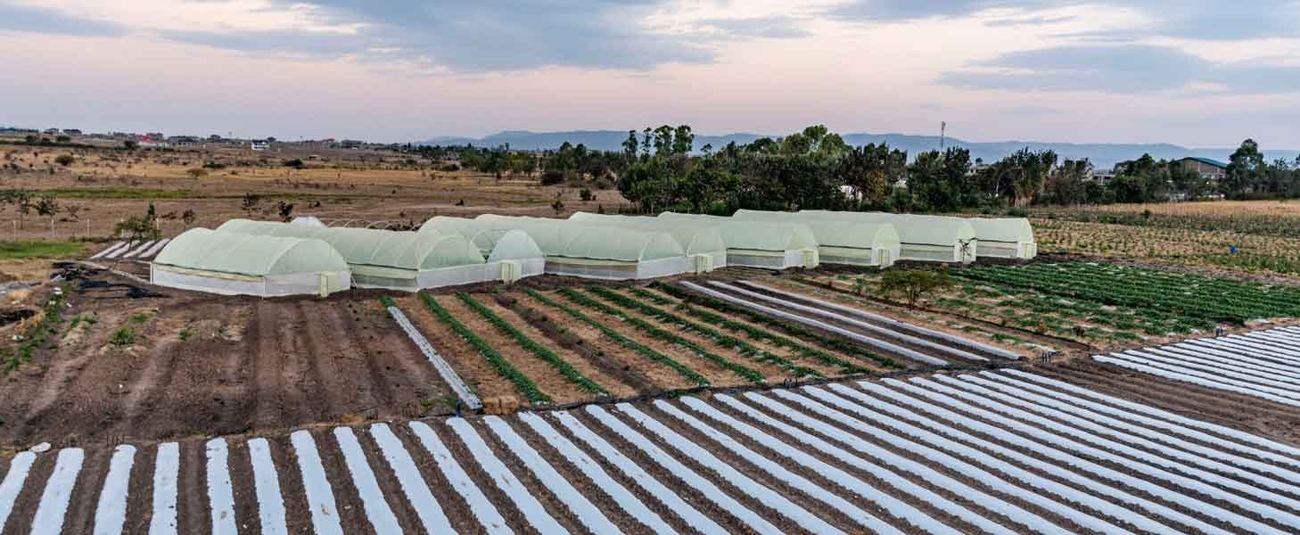
The Africa Adaptation Acceleration program (AAAP) – a joint initiative of the African Development Bank and the Global Center on Adaptation – recently showcased its initiative to harness the dynamism and leadership of Africa’s youth to drive climate adaption innovation.
On the side-lines of the recent 3rd Gobeshona Global Conference(link is external), AAAP brought together participants in its YouthADAPT program to share their experiences with the program as well as strategies to scale up youth-led approaches to adaptation
In his opening remarks, Dr. Kevin Kariuki, African Development Bank Vice President for Power, Energy, and Climate & Green Growth underscored young people’s integral role in Africa’s sustainable development.
“Youth form the backbone of Africa’s population, constituting over 60% of the population. The continent’s sustainable development hinges on harnessing this demographic dividend,” Kariuki said. “The AAAP, through its YouthADAPT pillar, has so far supported 35 youth-led enterprises in 14 African countries with $3.5 million to drive climate actions in sectors such as agriculture, waste management, renewable energy, water and sanitation,” Kariuki added. YouthADAPT is one of AAAPs four pillars for accelerating climate adaptation.
Caroline Mukuhi Mwangi, founder of Kimplanter Seedling(link is external) and Nurseries Limited, said her company was already seeing the benefits of participation in the program. Kimplanter provides drought resistant seedlings that boost food production and food security in Kenya.
Mwangi said, “We have ventured into new markets in semi-arid regions and expanded our seedling varieties, increasing our revenue by 36% as a result of AAAP support. Our customer base has also grown from 8,000 to 16,000 farmers and we have increased our staff from 17 to 32, all of whom are women or youth.”
Aramide Abe, the Program Lead of Jobs for Youth & Entrepreneurship at the Global Center on Adaptation(link is external) confirmed that participating enterprises have already begun to show results. She said some have seen revenues rise by up to 50 percent. A fifth have ventured into new markets and have raised over $106,000 in additional funding from different sources.
Juveline Ngum, the founder of Bleaglee Waste Management Limited, a Cameroon-based start-up company using drone technology to tackle waste disposal, also stressed the benefits of participating in YouthADAPT.
“We have expanded our waste disposal management solution from west Cameroon into Douala, effectively using drones to detect clogged drainages and utilizing data for demand driven waste management,” Ngum said. Now, we aim to expand across national borders into Dakar, Senegal.”
Noël N'guessan’s Cote d’Ivoire-based company, LONO(link is external) – a winner of the 2022 YouthADAPT challenge – has patented technology for the production of organic fertilizer. The company has also introduced modular and mobile bio digesters for the agri-food sector. Biodigesters use microbes and other bacteria to break down organic waste including fat, greases, and even animal manure.
Still, Nguessan said challenges remained. “The cost of prototyping hardware equipment can be prohibitively high, resulting in lengthy project development cycles, “he said. He pointed to financial management training as vital for youth-led businesses.
The session also featured presentations by African Development Bank partners and other global organizations that have rolled out similar initiatives to YouthAdapt.
Sandra Simbiri, Program Specialist at UNICEF’s Generation Unlimited(link is external), said:
“Supporting entrepreneurs through STEM principles is key to preparing the young for technological innovations.”
Alfred Asiko, Senior Market Engagement Manager for the ClimateTech Programme at GSMA(link is external), a mobile technology association, said it has played a role in empowering youth to deploy such technologies as the Internet of Things, artificial intelligence and blockchain to tackle climate challenges.
“Through our innovation fund, we offer grants to climate startups, with a focus on supporting resilient solutions that utilize frontier technologies. We also provide skills development and training to help entrepreneurs succeed in scaling their innovations,” Asiko said.
He said that venture capital (VCs) firms had a critical role to play. ”We need to see more VCs stepping up and taking over from development finance institutions (DFIs) in providing financing and support to youth-led businesses,” he added.
YouthADAPT targets reaching 10, 000 African youth-led enterprises by 2025, promoting innovation and inclusive growth for young people in climate resilient jobs and through youth enterprise development. The AAAP’s other three pillars are Climate-Smart Digital Technologies for Agriculture and Food Security; the African Infrastructure Resilience Accelerator and the Innovative Financial Initiatives for Africa
The third annual Gobeshona Global Conference, organized by the International Centre for Climate Change and Development, took place virtually from 10-16 March 2023. It focused on monitoring Locally- Led Adaptation (LLA) and resilience.
20 young African entrepreneurs bag $100,000 each to boost their climate adaptation businesses
Programme Showcases African youths driving climate novelty
African Development Bank-supported Cameroonian start-up provides low-cost greenhouses, sustainable solutions to boost livelihoods
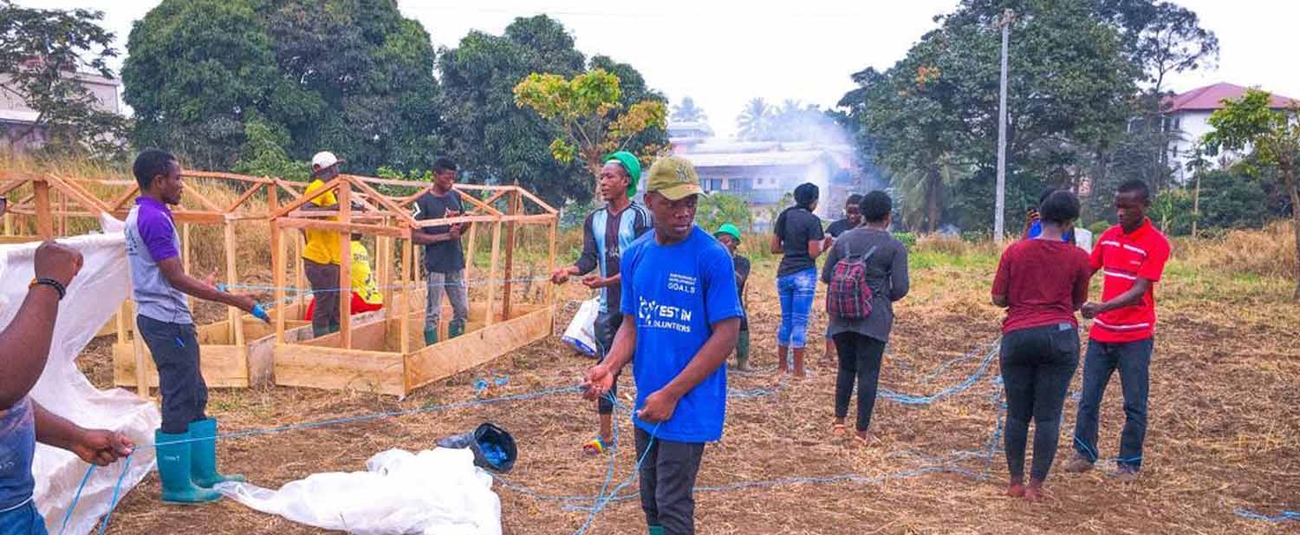
A youth-led agricultural start-up is supporting farmers in climate-vulnerable Cameroon to produce crops sustainably year-round using low-cost greenhouses and solar-powered irrigation.
Mumita Holdings is a beneficiary of the African Development Bank’s investment into the channelling of private capital to young African entrepreneurs, who are seen as critical to unlocking innovative solutions to climate change and the continent’s energy transition.
Tackling climate change is an urgent global priority and perhaps more critical in Africa. The continent is home to nine of the ten countries most vulnerable to climate change worldwide. In response to this pressing challenge, the African Development Bank Group has committed to mobilize $25 billion in climate finance by 2025.
Mumita’s CEO, Matiedje Nkenmayi Gislaine, was among 15 winners of the 2021 African Youth Adaptation (YouthADAPT) Solutions Challenge, organized annually by the bank and the Global Centre on Adaptation as part of their joint Africa Adaptation Acceleration Program (AAAP). Mumita received a development grant of $100,000 and participated in a 12-month business accelerator program to scale up the business, create more jobs and expand its impact.
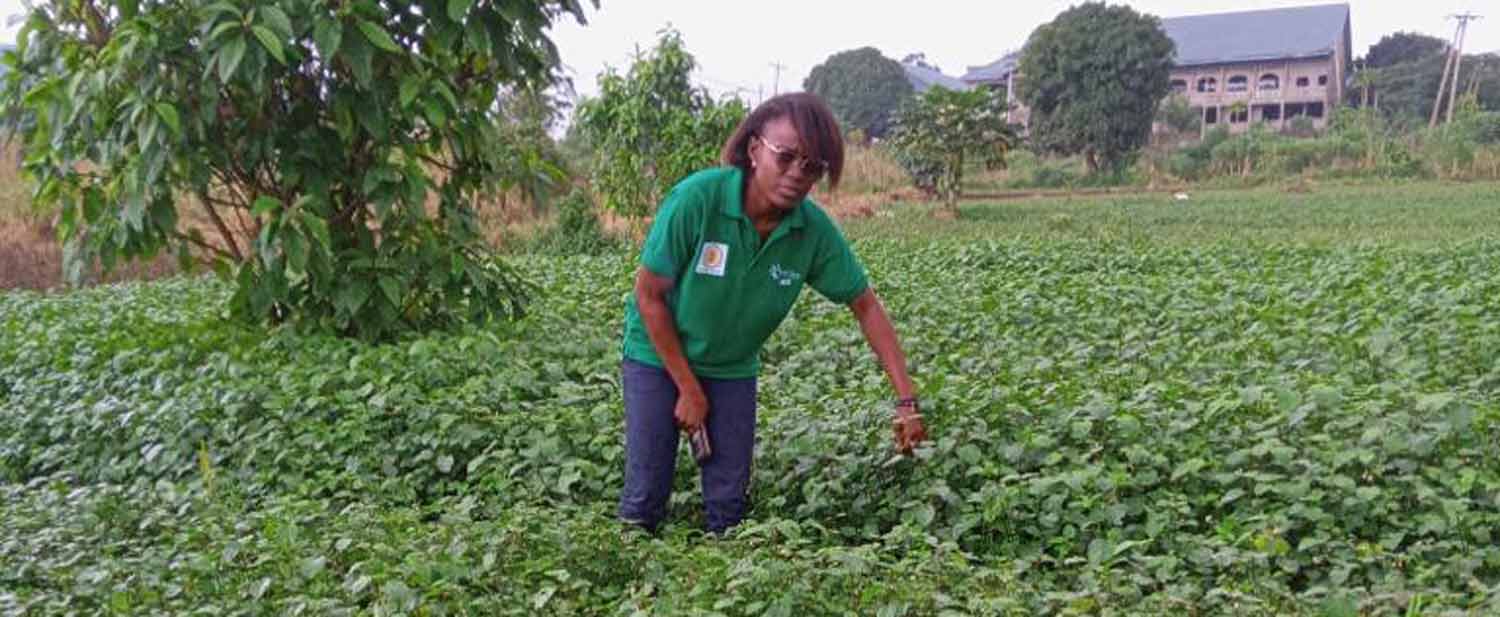
Mumita supports farmers in climate-vulnerable Cameroon to produce crops sustainably year-round using low-cost greenhouses and solar-powered irrigation. The firm mainly targets rural women farmers that cultivate African indigenous green leafy vegetables such as ndole and eru, or bitter leaf and wild spinach. These vegetables are an important source of revenue and nutrition. Demand for these leafy greens and tubers has increased, but production has not kept pace. At the same time, climate change impacts, including erratic rainfall patterns, have also hurt yields.
Mumita provides low-cost greenhouses that facilitate the year-round cultivation of vegetables. The greenhouses are made from materials such as wood, cement and mesh that are sourced locally from farmers. This has reduced the cost of building a greenhouse from $2,500 to about $500. The cost reduction has boosted yields and earnings. Mumita has also partnered with French company ASAP PROS1 to brand vegetable packaging with its own label.
For Nkenmayi, winning the YouthADAPT Challenge translated into multiple benefits for her business and rural communities in Cameroon.
“YouthADAPT funding has enabled us to construct two steel greenhouses in two cooperatives, as well as 10 wooden greenhouses, which has helped improve the capacity of vegetable nurseries from 1,500 seedlings to 25,000 seedlings,” Nkemanyi said. “We have also set up a processing unit, which can transform 1 tonne of dried vegetables per week, up from an initial 100 kg. We have also trained over 2,300 farmers in 10 villages in the southwest region, Mbanga in the Littoral region, Bamenda in the Northwest, and Boumnybel,” she added.
Currently, Mumita can supply indigenous dried vegetables in most of Cameroon but aims to expand coverage within and into other parts of sub-Saharan Africa.
The African Development Bank recognises the critical role of private investment, in closing financing gaps to drive green growth and build climate resilience. In line with this commitment, the bank is focusing on Mobilizing Private Sector Financing for Climate and Green Growth in Africa as the central theme of its 2023 Annual Meetings scheduled for 22-26 May in Sharm El Sheikh, Egypt
AAAP webinar: Innovation essential for climate-smart future, but it's not enough
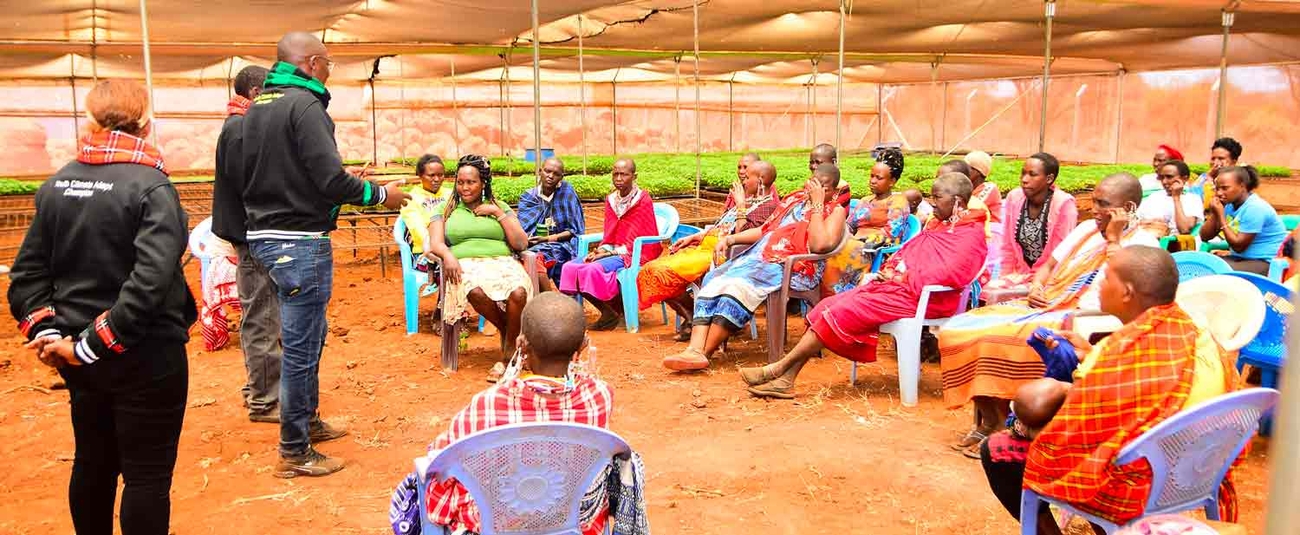
The 2022 United Nations Climate Change Conference, COP27, is dubbed ‘African COP’ as the impact of climate change on African countries will be a key theme of discussions. Agriculture and food systems will also be a critical focus of COP27, with Saturday, 12 November, dedicated to both themes, in addition to adaptation. Also high on the climate agenda is the role of the youth, as 10 November is dedicated to their participation.
Ahead of COP27 and in line with their commitment to this youth agenda, the African Development Bank and the Global Center on Adaptation hosted a webinar to examine ways to make agriculture attractive to the youth.
The webinar titled, Are Climate-Smart and Digital Agriculture Solutions the Silver Bullet to Attract Youth, highlighted the potential of climate-smart and digital agriculture in attracting young people and thereby rejuvenating an aging global agricultural sector.
Dr. Kevin Kariuki, African Development Bank’s Vice President for Power Energy, Climate and Green Growth, pointed out the challenges the agriculture sector faces due to the changing climate change.
“Agriculture across most of sub-Saharan Africa is still predominantly rain-fed and therefore extremely vulnerable to both short-term fluctuations and long-term changes in climate conditions. It is the most exposed sector with estimates indicating that climate change will cause a decrease in yields of 8 – 22% for Africa’s rain-fed staple crops over the next 20 years,” Kariuki said.
Dr. Beth Dunford, African Development Bank’s Vice President for Agriculture, Human and Social Development, noted that while agriculture holds tremendous potential for job creation in Africa, its current traditional form is not attractive to young people for various reasons, including negative perceptions.
“Who wants to wear overalls, dig the field with a hoe or drive a tractor when we can do it in a suit and dust coat, right? However, technology makes agriculture cool enough to motivate them to use tech-enabled enterprises to be part of agricultural value chains,” Dunford said.
Prof. Anthony Nyong, Senior Director for Africa at the Global Centre on Adaptation, said: “There is a gap in the agriculture sector in Africa, and that is in the use of digital solutions.”
AAAP’s Climate Smart Digital Technologies for Agriculture and Food Security Pillar is scaling up access to digital technologies and associated data-driven agricultural and financial services for at least 30 million African farmers.
In the African Development Bank’s Program to Build Resilience for Food and Nutrition Security in the Horn of Africa (BREFONS), currently ongoing in Djibouti, Ethiopia, Kenya, Somalia, South Sudan, and Sudan, the AAAP is facilitating the integration of climate-smart digital technologies for adaptation and resilience.
“The project will increase the productivity of crops and livestock by 30%, reaching about 1.3 million farmers and pastoralists using climate services such as index insurance. About 55,000 additional jobs will be created for youth and women,” said Oluyede Ajayi, Africa Program Lead, Food Security and Rural Well Being, Global Centre on Adaptation.
Panelists said the youth must utilize their digital skills to accelerate the transformation of the agricultural sector, which forms the central pillar of Africa’s economy. They urged participants to contribute to solutions that enhance market linkages to promote agribusiness.
“Africa’s significant youth population faces rising unemployment with myriad negative consequences. These challenges are further exacerbated by climate shocks, skill gaps & limited preparedness to address the effects of climate change,” said Andre-Marie Taptue, Principal Economist at the African Development Bank's Jobs for Youth program.
AAAP’s YouthAdapt program promotes sustainable job creation through entrepreneurship in climate adaptation and resilience in Africa by unlocking $3 billion in credit for adaptation action.
Last year, the first set of ten young African entrepreneurs and Micro, Small, and Medium-sized Enterprises offering innovative solutions and business ideas that can drive climate change adaptation and resilience were awarded at COP26 in Glasgow. This year the Africa Youth Adaptation Competition 20 enterprises across Africa will each receive up to $100,000 in addition to mentorship and coaching to support their climate change adaptation innovation.
Panelists included Claude Migisha from the African Development Bank, Dr. Fleur Wouterse, and Aramide Abe from the Global Center of Adaptation. They shared their views on how AAAP was shaping and adding value to the Bank Digital Agriculture Flagship program, ways to accelerate investor engagement in agriculture adaptation, and how the YouthADAPT was moving the needle on entrepreneurship, unlocking finance and job creation.
Gislaine Matiedje Nkenmayi from Mumita Holdings, a recipient of the 2021 YouthADAPT Challenge award, shared her experience on how the $100,000 grant transformed her enterprise.
“With the grant, we were able to reach out to more than 10 cooperatives with a total of 257 smallholder farmers, to whom we offer free advisory services, low-cost greenhouses and solar-powered irrigation systems. We have been able to expand production from 100kg to 1000kg of fresh vegetables weekly,” Nkenmayi said.
In her concluding remarks, Edith Ofwona Adera, Principal Regional Climate Change Officer and AAAP coordinator at the Bank stressed the need to strengthen adaptation and resilience measures and expedite mainstreaming climate adaptation for transformation at scale. She called for the engagement of the private sector, given the role they can play in adapting to climate change, financing adaptation, and supporting others through products and services for resilience.
Winners of the 2021 YouthADAPT Challenge acquire skills to accelerate climate adaptation innovation and create green jobs

Winners of the Africa Adaptation Acceleration Program’s 2021 YouthADAPT Challenge have received training to equip them to produce and scale climate-related innovation and create green jobs.
The challenge competition awards business grants of up to $100,000 to young entrepreneurs and micro, small, and medium-sized enterprises in Africa to develop innovative solutions on climate adaptation and resilience.
During the three-day workshop, the 2021 winners – 10 representatives of enterprises from Ghana, Nigeria, Cameroon, Kenya and Zambia – received training in financial management and fundraising. Winning enterprises also received training on budgeting and cash flow projection, record keeping, and executing solid business plans.
The 10 entities are developing solutions in critical social and economic sectors affected by climate change, including agriculture; waste management; water resources and sanitation; renewable energy and energy efficiency; waste management and ecosystem restoration. Half of the enterprises are women-led businesses.
The training also instructed participants in how to position their enterprises in the market in order to offer an attractive funding proposition.
Ifeoluwa Olatayo of Soupah Farms-en-market in Nigeria, said she learned a lot during the training, including “how best to review the company’s finances and budget against unexpected shortfalls.”
Another participant, Juveline Ngum Ngwa of Mumita Holdings Limited in Cameroon, acknowledged the importance of budgeting in her enterprise’s overall success and security. “It allows us to better understand whether our business has enough revenue to pay its expenses,” Ngum Ngwa said.
Carolyne Mukuhi of Kimplanter Seedlings in Kenya said: “We look forward to this great journey towards a successful, impactful climate-adaptable business. A great world together.”
In addition to the training, the winning enterprises will be provided with mentorship and support to expand partnerships, knowledge sharing and learning through a network of young entrepreneurs in climate adaptation. The challenge also offers its winners an opportunity to participate in a 12-month business accelerator program to help them scale up their businesses, deepen their impact and create decent jobs.
An annual competition, the challenge falls under one of the pillars of the Africa Adaptation Acceleration Program, namely empowering youth for entrepreneurship and job creation in climate adaptation and resilience. The strategic goal is to strengthen inclusive growth and broaden investment and economic opportunities for youth in Africa by providing training, mentorship, and financing to youth-led businesses.
The Africa Adaptation Acceleration Program is a partnership between the African Development Bank and the Global Center on Adaptation.
The African Development Bank’s contribution to the YouthAdapt Challenge was sourced from the Youth Entrepreneurship and Innovation Multi-donor Trust Fund.
